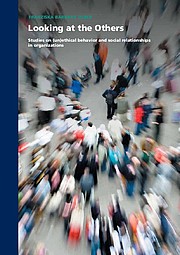Looking at the Others. Studies on (un)ethical behavior and social relationships in organizations Defended on Friday, 9 December 2016
This dissertation asks how social relationships matter for a person’s ethical or unethical behavior in an organization.
Two observations motivate this question. First, in organizations, the network of formally prescribed and informally emerging social relationships with others constitutes the distinctive context for the behavior of the individuals. Second, (un)ethical behavior is inherently social in that the consideration of other persons is at the heart of ethics.
Four independent studies each answer a specific question derived from this overarching question. The first study explores the role of social relationships in the process of spread of unethical behavior by developing a dynamic actor-oriented social network analysis framework. The second study focuses on the role of social relationships as conduits for information about unethical behavior, and empirically compares observer-reports on unethical behavior to self-reports. The third study empirically analyzes how unethical behavior by peers, which defines the descriptive norms, interacts with the formal rules, which constitute the injunctive norms, to influence individuals’ unethical behavior. The fourth study examines philosophical views which conceive social relationships as the source of ethical obligations to formulate a normative core for an individual-oriented version of stakeholder theory.
Taken together, the results of this research show that social relationships can foster as well as impede unethical behavior depending on their specific constellation and on perceptions of their nature; that they are affected by unethical behavior; and that attempts to prevent unethical behavior in organizations are unlikely to be successful unless social relationships are taken into consideration.
Keywords
business ethics; unethical behavior; misconduct; social network analysis; survey; social norms; social influence; stakeholder theory; continental philosophy








